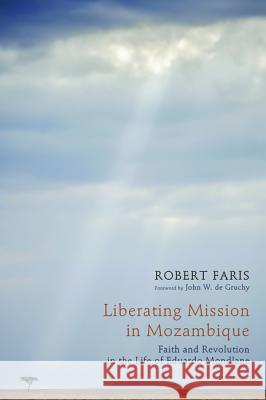Liberating Mission in Mozambique: Faith and Revolution in the Life of Eduardo Mondlane » książka
Liberating Mission in Mozambique: Faith and Revolution in the Life of Eduardo Mondlane
ISBN-13: 9781610972079 / Angielski / Miękka / 2014 / 238 str.
Liberating Mission in Mozambique: Faith and Revolution in the Life of Eduardo Mondlane
ISBN-13: 9781610972079 / Angielski / Miękka / 2014 / 238 str.
(netto: 134,53 VAT: 5%)
Najniższa cena z 30 dni: 140,10
ok. 16-18 dni roboczych.
Darmowa dostawa!
Few people have any extensive knowledge of the life and witness of the Protestant churches in the former Portuguese colonies of southern Africa. Yet these communities of faith played a significant role in the liberation struggles that led to the independence of both Mozambique and Angola and subsequently to the independence of Zimbabwe and the ending of apartheid in South Africa. In Mozambique, Eduardo Mondlane emerged from the Swiss Mission to become the first president of the Mozambique Liberation Front (FRELIMO). This book examines Mondlane's role in challenging the churches both in Mozambique and globally to support the struggle for independence through a renewed understanding of the missio Dei, God's liberating mission in the world. Mondlane maintained a strong connection with the World Council of Churches and was a key player in bringing about its Programme to Combat Racism after the 1968 Assembly in Uppsala before his assassination in 1969. This connection was to have important implications for the WCC's complex relationship with Mozambique and its Protestant churches following independence. "This book offers a new perspective on Mondlane's life, it renews our understanding of religion and politics in Mozambique, and it demonstrates brilliantly how the world missionary movement evolved, including the World Council of Churches, at the interface between structural constraints and the action of individuals." --Eric Morier-Genoud, lecturer, African history, Queen's University of Belfast, UK "Eduardo Mondlane was a giant within the movement to liberate Portugal's African colonies. Relying on a broad range of primary sources and his own personal experience, both in Mozambique and in the church, Robert Faris reveals the tensions in Mondlane's life, between the struggle for personal freedom and the armed struggle for liberation, between theology and liberation." --Frank J. Luce, associate fellow, Harriet Tubman Institute, York University, Canada "Portuguese-speaking countries and Christian missions in Africa are two topics on which many content themselves with gross generalizations. With his vivid yet soundly researched portrait of Eduardo Mondlane, the--assassinated--leading figure in Mozambique's struggle for independence, Bob Faris gives us a fascinating and deeply enriching insight into the complex interactions between the local people, Western missionaries, and the representatives of the colonial system." --Benedict Schubert, lecturer, missiology, Basel University, Switzerland Robert Faris taught at the ecumenical Seminario Unido de Ricatla in Mozambique during a period of significant transition, from 1989 to 1994. His experience there led him into an examination of the largely untold story of the role of the Protestant churches in the country's struggle for liberation. He is currently Associate Minister at St. Andrew's Presbyterian Church in Toronto, Canada."
Few people have any extensive knowledge of the life and witness of the Protestant churches in the former Portuguese colonies of southern Africa. Yet these communities of faith played a significant role in the liberation struggles that led to the independence of both Mozambique and Angola and subsequently to the independence of Zimbabwe and the ending of apartheid in South Africa. In Mozambique, Eduardo Mondlane emerged from the Swiss Mission to become the first president of the Mozambique Liberation Front (FRELIMO). This book examines Mondlanes role in challenging the churches both in Mozambique and globally to support the struggle for independence through a renewed understanding of the missio Dei, Gods liberating mission in the world. Mondlane maintained a strong connection with the World Council of Churches and was a key player in bringing about its Programme to Combat Racism after the 1968 Assembly in Uppsala before his assassination in 1969. This connection was to have important implications for the WCCs complex relationship with Mozambique and its Protestant churches following independence."This book offers a new perspective on Mondlanes life, it renews our understanding of religion and politics in Mozambique, and it demonstrates brilliantly how the world missionary movement evolved, including the World Council of Churches, at the interface between structural constraints and the action of individuals."--Eric Morier-Genoud, lecturer, African history, Queens University of Belfast, UK"Eduardo Mondlane was a giant within the movement to liberate Portugals African colonies. Relying on a broad range of primary sources and his own personal experience, both in Mozambique and in the church, Robert Faris reveals the tensions in Mondlanes life, between the struggle for personal freedom and the armed struggle for liberation, between theology and liberation."--Frank J. Luce, associate fellow, Harriet Tubman Institute, York University, Canada"Portuguese-speaking countries and Christian missions in Africa are two topics on which many content themselves with gross generalizations. With his vivid yet soundly researched portrait of Eduardo Mondlane, the--assassinated--leading figure in Mozambiques struggle for independence, Bob Faris gives us a fascinating and deeply enriching insight into the complex interactions between the local people, Western missionaries, and the representatives of the colonial system."--Benedict Schubert, lecturer, missiology, Basel University, SwitzerlandRobert Faris taught at the ecumenical Seminário Unido de Ricatla in Mozambique during a period of significant transition, from 1989 to 1994. His experience there led him into an examination of the largely untold story of the role of the Protestant churches in the countrys struggle for liberation. He is currently Associate Minister at St. Andrews Presbyterian Church in Toronto, Canada.











